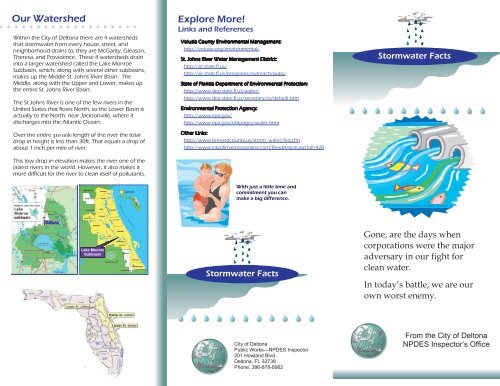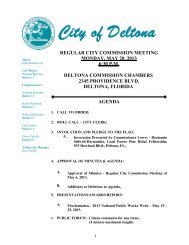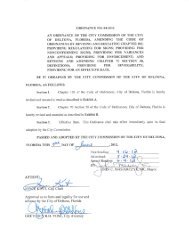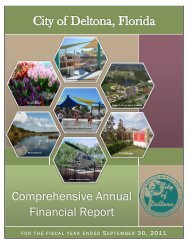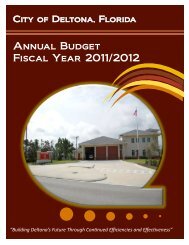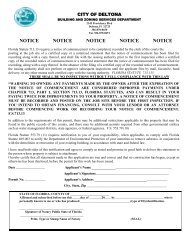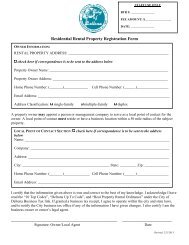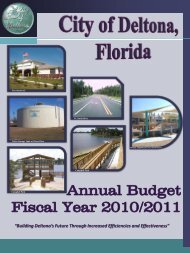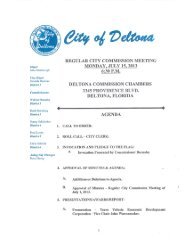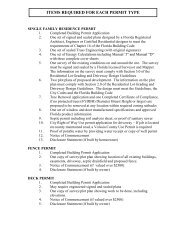Stormwater Facts Brochure - City of Deltona, Florida
Stormwater Facts Brochure - City of Deltona, Florida
Stormwater Facts Brochure - City of Deltona, Florida
You also want an ePaper? Increase the reach of your titles
YUMPU automatically turns print PDFs into web optimized ePapers that Google loves.
Our Watershed<br />
Within the <strong>City</strong> <strong>of</strong> <strong>Deltona</strong> there are 4 watersheds<br />
that stormwater from every house, street, and<br />
neighborhood drains to, they are McGarity, Gleason,<br />
Theresa, and Providence. These 4 watersheds drain<br />
into a larger watershed called the Lake Monroe<br />
Subbasin, which, along with several other subbasins,<br />
makes up the Middle St. Johns River Basin. The<br />
Middle, along with the Upper and Lower, makes up<br />
the entire St. Johns River Basin.<br />
The St Johns River is one <strong>of</strong> the few rivers in the<br />
United States that flows North, so the Lower Basin is<br />
actually to the North, near Jacksonville, where it<br />
discharges into the Atlantic Ocean.<br />
Over the entire 310 mile length <strong>of</strong> the river the total<br />
drop in height is less than 30ft. That equals a drop <strong>of</strong><br />
about 1 inch per mile <strong>of</strong> river.<br />
This low drop in elevation makes the river one <strong>of</strong> the<br />
laziest rivers in the world. However, it also makes it<br />
more difficult for the river to clean itself <strong>of</strong> pollutants.<br />
Explore More!<br />
Links and References<br />
Volusia County Environmental Management:<br />
http://volusia.org/environmental/<br />
St. Johns River Water Management District:<br />
http://sjr.state.fl.us/<br />
http://sjr.state.fl.us/programs/outreach/pubs/<br />
State <strong>of</strong> <strong>Florida</strong> Department <strong>of</strong> Environmental Protection:<br />
http://www.dep.state.fl.us/water/<br />
http://www.dep.state.fl.us/secretary/cs/default.htm<br />
Environmental Protection Agency:<br />
http://www.epa.gov/<br />
http://www.epa.gov/ebtpages/water.html<br />
Other Links:<br />
http://www.brevardcounty.us/storm_water/faq.cfm<br />
http://www.city<strong>of</strong>invernessonline.com/ReadArticle.aspid=428<br />
With just a little time and<br />
commitment you can<br />
make a big difference.<br />
<strong>Stormwater</strong> <strong>Facts</strong><br />
<strong>Deltona</strong><br />
Lake Monroe<br />
Subbasin<br />
<strong>Stormwater</strong> <strong>Facts</strong><br />
Gone, are the days when<br />
corporations were the major<br />
adversary in our fight for<br />
clean water.<br />
In today’s battle, we are our<br />
own worst enemy.<br />
<strong>City</strong> <strong>of</strong> <strong>Deltona</strong><br />
Public Works—NPDES Inspector<br />
201 Howland Blvd.<br />
<strong>Deltona</strong>, FL 32738<br />
Phone: 386-878-8962<br />
From the <strong>City</strong> <strong>of</strong> <strong>Deltona</strong><br />
NPDES Inspector’s Office
In recent years it has been our action and inaction<br />
toward stormwater run<strong>of</strong>f that has caused the greatest<br />
amount <strong>of</strong> pollutants to enter our waters.<br />
<strong>Stormwater</strong> Run<strong>of</strong>f<br />
<strong>Stormwater</strong> run<strong>of</strong>f is also called non-point source discharge<br />
(NPS), because it cannot be traced back to a specific starting<br />
point, it runs <strong>of</strong>f <strong>of</strong> large areas <strong>of</strong> impervious surfaces, which<br />
is more apparent in urban areas.<br />
Homes, construction, and other impervious surfaces, such<br />
as roads and driveways, are part <strong>of</strong> urban development<br />
and have a direct impact on the amount and quality <strong>of</strong><br />
stormwater run<strong>of</strong>f that enter our nation’s waterways.<br />
A common misconception is that stormwater enters the<br />
sewage treatment system, it does not. <strong>Stormwater</strong> is<br />
directed to the Lakes, Rivers, and Ponds near us.<br />
NPS Pollution <strong>Facts</strong><br />
The first inch <strong>of</strong> stormwater run<strong>of</strong>f carries 90% <strong>of</strong> the<br />
pollutants from our streets, homes, yards, industrial<br />
activities and constructions sites.<br />
At least 50% <strong>of</strong> water quality problems in the U.S.<br />
result from NPS pollution.<br />
<strong>Stormwater</strong> contributes about 80 to 95 percent <strong>of</strong> the<br />
heavy metals that enter <strong>Florida</strong>’s waterways. Some<br />
examples <strong>of</strong> heavy metals are: Arsenic, Lead, and Mercury.<br />
Fertilizer run<strong>of</strong>f from residential areas is responsible for<br />
1/3 <strong>of</strong> the excess nitrogen polluting our waterways.<br />
What Has Been Done<br />
In 1972 the NPDES was created in section 402 <strong>of</strong> the<br />
Clean Water Act, to help combat the effects <strong>of</strong><br />
stormwater pollution on the nation’s waters.<br />
1987—NPDES permits for stormwater discharges into<br />
waterways were established.<br />
1990—Municipalities with populations over 100,000 must<br />
have Phase I MS-4 permits<br />
1999—Municipalities with populations over 50,000 must<br />
have Phase II MS-4 permits<br />
2004—The <strong>City</strong> <strong>of</strong> <strong>Deltona</strong> is granted a Phase II MS4<br />
permit to discharge stormwater by the State <strong>of</strong> <strong>Florida</strong>.<br />
What is NPDES<br />
NPDES stands for the National Pollutant Discharge<br />
Elimination System. The NPDES system issues permits<br />
that allow others to discharge stormwater following<br />
certain rules; these permits include:<br />
<br />
<br />
Construction—Construction Generic Permit (CGP)<br />
Industrial—Multi-Sector Generic Permit (MSGP)<br />
Municipalities—Phase II (MS4)<br />
The MS4 permit for municipalities, like <strong>Deltona</strong>, must<br />
follow 6 minimum control measures:<br />
1. Public Education and Outreach<br />
2. Public Participation and Involvement<br />
3. Illicit Discharge Detection and Elimination<br />
4. Control Construction Site Run<strong>of</strong>f<br />
5. Post-construction <strong>Stormwater</strong> Management<br />
6. Municipal Operation Pollution Prevention<br />
For more information visit the links on the back <strong>of</strong> this<br />
brochure, or contact the <strong>City</strong> NPDES Inspector’s Office.<br />
NPDES Run<strong>of</strong>f <strong>Facts</strong><br />
Because <strong>of</strong> impervious surfaces, such as pavement<br />
and ro<strong>of</strong>tops, a typical city block generates 9 times more<br />
run<strong>of</strong>f than a woodland area <strong>of</strong> the same size.<br />
Untreated stormwater run<strong>of</strong>f is now considered the<br />
state <strong>of</strong> <strong>Florida</strong>’s leading source <strong>of</strong> water pollution.<br />
Wetlands receive significant amounts <strong>of</strong> NPS<br />
pollution because they are typically the lowest point on<br />
the landscape.<br />
Some Common Pollutants found in<br />
stormwater run<strong>of</strong>f are:<br />
USED MOTOR OILS & GREASES<br />
FOAM CUPS, PLASTICS, PAPER & CIGARETTE BUTTS<br />
(GENERAL TRASH)<br />
TRIMMINGS FROM LAWNS, TREES & LANDSCAPING<br />
ANTIFREEZE, CLEANERS, & SOLVENTS<br />
PESTICIDES, FERTILIZERS, & HERBICIDES<br />
EROSION & MATERIALS FROM CONSTRUCTION<br />
PET DROPPINGS & BACTERIA<br />
What Can We Do<br />
Lawn Care Auto Care Septic System Chemicals<br />
Don’t over<br />
water lawns<br />
Use pesticides<br />
and<br />
fertilizers<br />
sparingly<br />
Cover piles<br />
<strong>of</strong> dirt or<br />
mulch to<br />
prevent<br />
erosion<br />
Use a car<br />
wash or<br />
wash your<br />
car on the<br />
lawn so that<br />
water can<br />
soak-in<br />
Repair leaks<br />
and recycle<br />
used fluids or<br />
dispose <strong>of</strong><br />
properly<br />
Recycle batteries<br />
or dispose<br />
<strong>of</strong><br />
properly<br />
Inspect and<br />
maintain your<br />
septic system<br />
at least every 3<br />
years<br />
Don’t dispose<br />
<strong>of</strong> household<br />
hazardous<br />
waste in sinks<br />
or toilet<br />
Purchase<br />
cleaners, and<br />
products that<br />
will not harm<br />
septic systems<br />
Recycle<br />
household<br />
chemicals or<br />
dispose <strong>of</strong><br />
properly<br />
Try to purchase<br />
more<br />
environmentally<br />
friendly<br />
products<br />
Do Not pour<br />
them onto<br />
the ground<br />
or into storm<br />
drains


